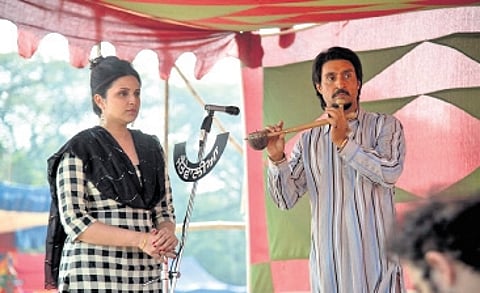'Amar Singh Chamkila' movie review: A musical fable which shines better on the edges
HYDERABAD : In a pre-release interview with this reviewer, virtuoso A.R. Rahman described 'Amar Singh Chamkila' with a philosophical, poetic brevity. “For me, it’s like a butterfly, short-lived but beautiful.” The metaphor fluttered in my head as I experienced Imtiaz Ali’s musical fable, which, if nothing else, is surely the filmmaker’s return to form.
A musician and his lover are slain because of their art. It’s a tale, that, if it weren’t real, was waiting to be dreamt up by Ali. But, barring a few initial scenes, there seems to be an unnecessary urgency in the storytelling. The meditative stillness the film begins with gets sidelined as the narrative picks up pace. There is a lot to be said and heard but nothing to latch on to. Facts often drive fiction into mundane turns. We see a 360-degree view of Chamkila’s life, but questions still remain about what was at its centre. Nothing lingers. The butterfly is too eager to jump to the next flower.
Chamkila’s life story begins with his death. We witness the events of March 8, 1988, in Punjab’s Mehsampur village. There for a show, his wife and music partner Amarjot Kaur (Parineeti Chopra) steps out of the couple’s iconic grey ambassador and gets shot in the head. Chamkila (Diljit Dosanjh) suffers a similar fate. As he lies on his back, bloodied, the nozzle of the killer’s rifle staring at his face, we pull into a sepia-toned flashback. The young singer sees a couple tussle over an affair. His curiosity with erections earns him a slap from his mother. Contrastingly, in another scene, he sees her clapping in jest as women, during a wedding celebration, sing about incoming marital pleasures. In these brief images, blurred on the edges like a memory turning hazy (cinematography by Sylvester Fonseca), we get a glimpse of the formative years of an artist. But the screenplay doesn’t wait for things to sink in as the beats of Mohit Chauhan’s Baaja catch tempo. There is so much to do and so little time.
As Chamkila and Amarjot’s bodies lie cold, awaiting cremation, their story is narrated by their friends and critics over the course of one night. It’s a templated telling though. In a scene that has become the bane of the performing artiste’s biopic (most recently seen in Bradley Cooper’s Maestro), Chamkila gets a break when his ustad (teacher), a seasoned singer, gets late for a stage show. Soon, his earthy songs find a mass appeal and his detractors increase. But all these forces: the rival musicians who were jealous of him; the self-appointed saviours of society who wanted to correct him; the militants who were probably miffed with his songs, remain on the fringes.
The 1984 insurgency also serves mostly as a silent spectator and although characters are often shown being wary of incoming militants, there is nothing more to it. With graphic-novel-like animations filling in for scenes, the film aims to be easy-going and pop. We see footage and monochrome photos of the time and it feels like Ali is more interested in the period than the person. Chamkila’s story remains a portrait being painted with the colours of what is happening around him and not with the hues of what is happening inside him.
Diljit plays Chamkila with an adorable softness and servility needed for the role. The global star feels at home on stage as he croons the late singer’s original songs with assurance. Amarjot, as a character, remains thin. The film doesn’t explore her much and resultingly, Parineeti’s performance is just sufficient.
A.R. Rahman’s music, coupled with Irshad Kamil’s lyrics, however, liven up the narrative. When love nestles between Amarjot and Chamkila, Tu Kya Jaane soothes in the background. Ishq Mitaye revs up the film when it starts lagging. My favourite Naram Kaalja, although picturised with a celebratory zest, is a random squeeze into the screenplay and works better as a standalone music video.
This is also the first time Ali is doing a biopic. The factual research often takes over the fictional narrative and makes it static. When the film’s climax is offered in the opening scene, the linear storyline doesn’t offer much of a surprise. Chamkila shines in its silences. In scenes where its titular character sits on a cart and hums a tune or where we see men hiding in tall-grass fields and women under the bed, scared after an assassination. It is great in fragments, with some parts filling in better than the entire narrative. A friend described the film as a basket of flowers, with different colours and fragrances. I was just hoping to find a rosebud.
Film: Amar Singh Chamkila
Cast: Diljit Dosanjh, Parineeti Chopra, Nisha Bano, Rahul Mittra, Vipin Katyal, Anjum Batra
Director: Imtiaz Ali
Rating: 3/5

